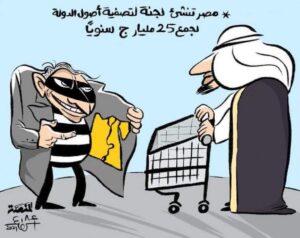Egypt is sending mix signals on its human rights records. Some in Cairo’s political system are trying hard to project the image of an Egypt complying with international human rights standards, but the security apparatus remains active in undermining those efforts and is instead worsening the country’s image. In a matter of a few days, we saw two very contradictory decisions that are telling about the intentions of the ruling class in Cairo. On the one hand, there was the release of 79 people who have been held in pretrial detention, giving the wrong impression that General Sisi and his system have Egypt’s human rights interest in minds. On the other hand, cartoonists and journalists continue to be terrorized by the security services and the political police. These events are indicative of continued use of tactics meant to intimidate people who hold different views than those of the political leaders and those in the military and the political police.
In the first case, the decision to release prisoners who have not faced trial yet was reportedly decided by President El Sissi, and announced by the Public Prosecution. The purpose of the release was a gesture of sort to create a conducive environment for national dialogue.
The National Dialogue is a process of encouraging stakeholders to discuss issues of national interest with the purpose of finding consensus on reforming the political, social, and economic systems. Participants in the National Dialogue should naturally be inclusive of groups that may not always agree on how governance is handled. It would normally include government, political parties, opposition figures, civil society organizations, and others. Among the hot topics addressed by the National Dialogue is the thorny issue of the highly punitive Code of Criminal Procedure and its excessive use of pretrial detention, which has wreaked havoc on Egypt’s human rights records.
In the second case, the country’s political police arrested last week satirical cartoonist Omar Ashraf and journalist Khaled Mamdouh for expressing views that the government deems unacceptable. Amnesty International qualifies these moves as “an escalation in their crackdown on the right to freedom of expression and independent media.”

Ashraf Omar cartoon that sent him to prison
Omar Ashraf’s satires are often political in nature. That’s what satirists do. He was arrested for referencing the government’s privatization initiative and poked fun at the sale of assets to buyers from the Gulf. The government’s message is essentially no one in Egypt is allowed to debate anything of national significance, as it is the domain only of General Sisi and the military establishment. The same can be said of journalist Khaled Mamdouh, who was picked up in his Cairo residence in the middle of night, as the political police were most likely unhappy about his independent views on national issues. Amnesty reports that the Supreme State Security Prosecution (SSSP) prosecutors questioned him about his media work, including his work with Arabic Post, the nature of articles he wrote for the website, and the salary he was receiving.” While “prosecutors did not present any evidence against Khaled Mamdouh,” they still ended up locking him up using the country’s brutal pretrial detention law. Many of the country’s top journalists are in prison, with Amnesty estimating them at 14.
So as many undertake efforts to improve Egypt’s human rights records, the country’s leadership remains steadfast in continuing to crackdown on any form of dissent. And pretrial detention is their preferred tool.




